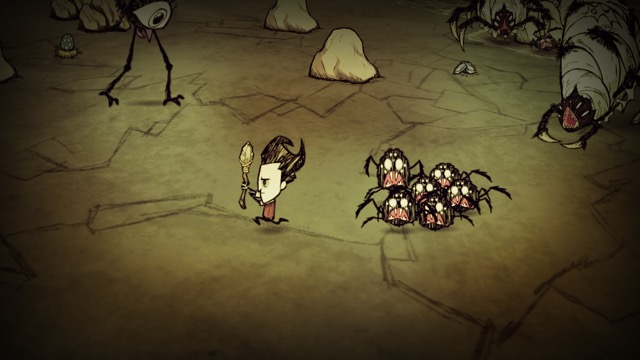Atmosphere

When we discuss games, especially those within the horror genre, this idea of “atmosphere” comes up again and again. I reference it rather frequently in my own writing, but one thing that we commonly neglect to do is actually say what we mean when we use it.
As it is right now, it exists as one of those, oft-used game review buzzwords, sitting alongside other repeat offenders: “visceral”, “moody”, “tight”, and countless others. We use it because it is easy, a simple way to get across a complex idea about the situations a game puts a player in, and the wide array of emotions that it evokes within you, and it would greatly benefit us all if we took the time to examine this sense to see what we really mean when we talk about atmosphere in a game.
We’ve all experienced that feeling before, of playing a game and having it drag you in, the room around you slowly fading into the background as you hunch over your controller or keyboard. You see something on the periphery of your screen and you dodge away, moving your entire body to avoid it, or maybe you feel nervous about opening the door in front of you as it looms ominously above you and you forget that you’re sitting in the safety of your own home, and believe that you are in this dangerous world.
It is the sum total of every part of the game that combine themselves together to create a mood that you can find yourself lost within.
Every aspect of the game factors into this feeling. The music sets the tone in the background, clueing you in to what you are supposed to be feeling, from the upbeat chirps of Zelda to the fast paced, brutal riffs of DOOM. This is complemented by the art style of the game itself. Anything can be given a sinister turn with a deformed, Tim Burton-esque art style, or feel cheery and wondrous with bright cell shading.
Mix in your story, which runs underneath everything else to tell you what you should be worried about coming next, and you start to see the beginnings of the picture that an atmosphere entails.
The problem with the term is how nebulous it is as we try to define it. When we use it in a review, readers instinctively know the general sense of what we are trying to coney, but we lose so much complexity and nuance by using these easy shortcuts. Even though we are getting the gist of the point across, it is still lacking in the subtleties of how you feel when you play.
It is hard to counteract this because of how nebulous these feelings are that we are trying to convey, but what might be more effective is to consider what about the game contributes to this feeling of atmosphere, and what kind of atmosphere it is creating. So instead of looking at a game like Don’t Starve and saying:
“It nails the atmosphere in a way that many games try and fail to do”
We could talk about how the combination of the angular and distorted art style alongside the melancholic strings of music in a hostile world create an inhospitable environment that you have to constantly be wary of, in a way that many games try and fail at. Even though the idea that we are trying to communicate is the same, one is way more informative than the other.
It’s why these words are tempting, because they allow us to say something that the audience understands while not really diving into the games themselves. It is the easy way out for us, and as such, should normally be avoided, but that is not to say that this shorthand has no place in a discussion of a game.
When we need to get our point across quickly, this shared vocabulary allows us to do so in a single word or phrase, based off a wealth of knowledge that we have built over the years of playing games and consuming media. But when we really want to examine a game for what it is and what it does, these shorthands needlessly limit us from exploring what really makes them tick.
_____________________________________________

Tom has been writing about media since he was a senior in high school. He likes long walks on the beach, dark liquor, and when characters reload guns in action movies.
You Might Also Like:
Music with a MessageThe Uncanny Valley
Roguelikes and Story
_____________________________________________
Images courtesy of Vlambeer, Galactic Cafe, and Cellar Door Games